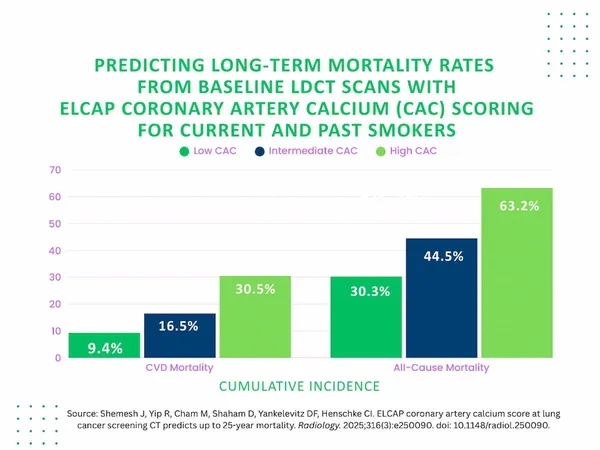
Shocking Study Reveals: High Coronary Artery Calcium Scores Could Double Your Risk of Heart Disease Death!
2025-09-03
Author: Jia
Groundbreaking Findings from a Massive Study
A recent study has turned heads in the medical community: coronary artery calcium (CAC) scoring from low-dose CT scans is a game-changer in predicting long-term cardiovascular mortality. Over 8,700 participants were analyzed, revealing startling correlations that could change how we assess heart health.
The Study Breakdown
Conducted as part of the Early Lung and Cardiac Action Program (ELCAP), this significant research involved 8,782 participants, mostly current and former smokers aged 40-85, who underwent LDCT scans from 2000 to 2004. With a median follow-up of 22.6 years, the results highlight the importance of CAC scoring in evaluating long-term health risks.
High CAC Scores Linked to Alarming Mortality Rates
The data is striking: participants with high CAC scores (4-12) faced a staggering 30.5% chance of dying from cardiovascular disease (CVD), compared to just 16.5% for those with intermediate scores (1-3) and 9.4% for low-risk scores (0). Overall mortality followed a similar pattern, with 63.2% of those with high CAC scores passing away from any cause over the study's duration.
Double the Risk—What It Means for You
Researchers found that high ELCAP-CAC scores were nearly twice as likely to lead to CVD death, and shockingly, over 2.8 times more likely to result in all-cause mortality when compared to low-risk scores. Dr. Joseph Shemesh, the lead author, emphasized that a single ELCAP-CAC score could serve as a powerful long-term predictor for CVD death.
Three Key Takeaways You Can't Ignore!
1. CAC scoring is a robust tool for predicting both cardiovascular and all-cause mortality, especially for those with high-risk scores. 2. No CAC detected signals a significantly favorable long-term outlook, underscoring its value even among high-risk smokers. 3. Integrating CAC scoring into lung cancer screening could enhance preventative measures, offering a comprehensive risk assessment beyond traditional methods.
Time for Change in Health Screenings?
The researchers argue passionately for the inclusion of CAC scoring in routine health screenings, pointing out that it could provide valuable insights into heart disease risks in current and former smokers. Their findings aren't just academic—they're a call to action for public health initiatives.
As Dr. Shemesh states, the time for implementing CAC scoring in screening programs is now, as it could dramatically alter risk assessments and ultimately save lives. Will this research pave the way for a new standard in preventive healthcare?



 Brasil (PT)
Brasil (PT)
 Canada (EN)
Canada (EN)
 Chile (ES)
Chile (ES)
 Česko (CS)
Česko (CS)
 대한민국 (KO)
대한민국 (KO)
 España (ES)
España (ES)
 France (FR)
France (FR)
 Hong Kong (EN)
Hong Kong (EN)
 Italia (IT)
Italia (IT)
 日本 (JA)
日本 (JA)
 Magyarország (HU)
Magyarország (HU)
 Norge (NO)
Norge (NO)
 Polska (PL)
Polska (PL)
 Schweiz (DE)
Schweiz (DE)
 Singapore (EN)
Singapore (EN)
 Sverige (SV)
Sverige (SV)
 Suomi (FI)
Suomi (FI)
 Türkiye (TR)
Türkiye (TR)
 الإمارات العربية المتحدة (AR)
الإمارات العربية المتحدة (AR)